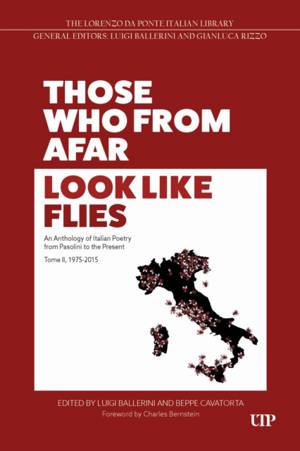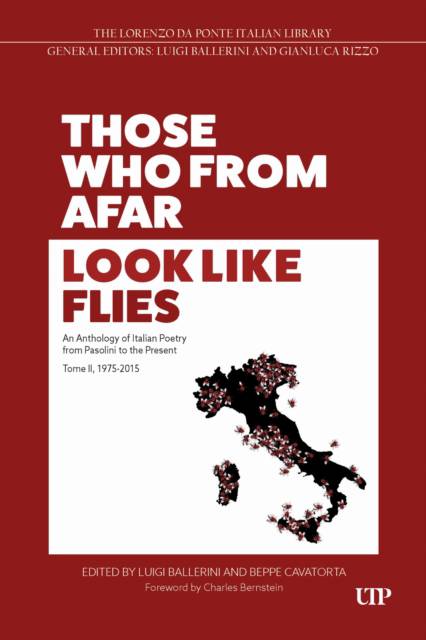
- Afhalen na 1 uur in een winkel met voorraad
- Gratis thuislevering in België vanaf € 30
- Ruim aanbod met 7 miljoen producten
- Afhalen na 1 uur in een winkel met voorraad
- Gratis thuislevering in België vanaf € 30
- Ruim aanbod met 7 miljoen producten
Zoeken
Those Who from Afar Look Like Flies
An Anthology of Italian Poetry from Pasolini to the Present, Tome II, 1975-2015
€ 279,45
+ 558 punten
Omschrijving
Those Who from Afar Look Like Flies is an anthology of poems, informative essays and statements on poetics that aim to provide an organic profile of the evolution of Italian poetry after World War II.
Picking up in the mid-1970s and culminating in present-day, the book refutes the decline of Italian poetry caused by the urgency of the era's political disarray. Documenting, among others, the works of Balestrini, Giuliani, Pagliarani, Pasolini, Rosselli, Sanguineti, Villa, and Zanzotto, the second volume of Those Who from Afar Look Like Flies is a collection of poems and essays organized in a series of connected sections where stylistic or substantial changes in intent in the poetics of a group or an individual poet are documented. Offering an extensive, chronological exploration, authors whose stylistic developments underwent significant changes appear more than once.
This volume proves how Italian research poetry developed and advanced and elaborates upon the legacy of the historical avant-garde and of the neo-avant-garde. Authorities on Italian literature Luigi Ballerini and Beppe Cavatorta argue against the notion that in the mid-1970s experimental poetry ceased to be a viable social activity and demonstrate instead the resurgence and enhancement of the literary art form.
Picking up in the mid-1970s and culminating in present-day, the book refutes the decline of Italian poetry caused by the urgency of the era's political disarray. Documenting, among others, the works of Balestrini, Giuliani, Pagliarani, Pasolini, Rosselli, Sanguineti, Villa, and Zanzotto, the second volume of Those Who from Afar Look Like Flies is a collection of poems and essays organized in a series of connected sections where stylistic or substantial changes in intent in the poetics of a group or an individual poet are documented. Offering an extensive, chronological exploration, authors whose stylistic developments underwent significant changes appear more than once.
This volume proves how Italian research poetry developed and advanced and elaborates upon the legacy of the historical avant-garde and of the neo-avant-garde. Authorities on Italian literature Luigi Ballerini and Beppe Cavatorta argue against the notion that in the mid-1970s experimental poetry ceased to be a viable social activity and demonstrate instead the resurgence and enhancement of the literary art form.
Specificaties
Betrokkenen
- Uitgeverij:
Inhoud
- Aantal bladzijden:
- 2120
- Taal:
- Engels
- Reeks:
Eigenschappen
- Productcode (EAN):
- 9781487564674
- Verschijningsdatum:
- 28/04/2026
- Uitvoering:
- Hardcover
- Formaat:
- Genaaid
- Afmetingen:
- 152 mm x 229 mm
- Gewicht:
- 1 g

Alleen bij Standaard Boekhandel
+ 558 punten op je klantenkaart van Standaard Boekhandel
Beoordelingen
We publiceren alleen reviews die voldoen aan de voorwaarden voor reviews. Bekijk onze voorwaarden voor reviews.







